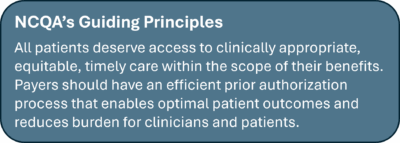Breaking Down Silos in Utilization Management: A Data-Driven Approach
September 11, 2025 · Becky Kolinski
Utilization management is a hot-button issue in the health care industry. Health plans view prior authorization as an essential function that protects patient safety, conserves financial resources and prevents fraud, waste and abuse. Clinicians report concerns and frustration with cumbersome prior authorization processes, and patients often experience delays or denials while attempting to obtain timely and necessary care.
Utilization management involves multiple organizations, including health plans, care delivery organizations and vendors. NCQA’s Accreditation programs use a data-driven approach to help align organizations around the patient and clinician experience.
“We’re trying to address multiple pain points in the prior authorization process by putting the patient and clinician experience front and center,” says Tsveta Polhemus, NCQA’s Assistant Vice President, Product Management. “At the same time, our standards create a glidepath for health plans to ensure compliance and manage risk.”
The Utilization Management Ecosystem
Health plans base prior authorization policies on clinical evidence and benefit plan designs. Health plans might manage UM internally, or might delegate a portion of the process to another organization. Plans must perform oversight of delegates and maintain accountability for UM decisions.
- NCQA’s Health Plan Accreditation provides a UM framework, and lets plans streamline oversight if they choose to delegate UM activities to an NCQA-Accredited/Certified delegate.
Health systems bear the administrative burden of submitting prior authorizations and the financial burden of denials. Accountable care organizations that assume financial risk for a population’s overall health might need to develop their own UM programs. Health plans may also delegate UM activities to health systems.
- NCQA’s Utilization Management Accreditation helps health systems develop efficient internal processes that align with requirements in Health Plan Accreditation. NCQA review can simplify oversight if delegated functions are performed on behalf of a health plan.
Delegated entities perform UM functions on behalf of another organization, and may perform a variety of activities or specialize in a specific area such as cancer treatment or behavioral health.
- NCQA’s Utilization Management Accreditation lets delegates choose which functions they want to have Accredited/Certified, and aligns with the Health Plan Accreditation standards to reduce the burden of oversight, making them attractive contracting partners for health plans.
State and federal regulatory agencies that oversee health care programs such as Medicare and Medicaid are accountable to patients—and to taxpayers. They want to hold health plans accountable for managing care and preventing fraud, waste and abuse while also providing a positive patient and clinician experience.
- NCQA’s Health Plan Accreditation or Utilization Management Accreditation can be a roadmap for states to oversee the activities of managed care organizations and help ensure continuous quality improvement in utilization management through a data-driven approach.
Self-insured employers have similar concerns about balancing financial stewardship and patient experience, and can benefit from partnering with third-party administrators that have validated UM processes.
- NCQA’s Utilization Management Accreditation can give self-insured employers confidence that third-party administrators perform UM activities efficiently and consistently—with the data and reporting to prove it.
The Value of NCQA Accreditation
We’ve updated our utilization management standards across three Accreditation and Certification programs: Health Plan Accreditation, Utilization Management Accreditation and Certification and Behavioral Health Accreditation (formerly MBHO Accreditation).

Updates focus on data collection to establish accountability and trust. “Utilization management has mostly been viewed as an operational function,” says Polhemus. “Our new standards enable organizations to view their prior authorization processes through a quality improvement lens by collecting and reporting key metrics.”
Key updates to the standards include:
- Data Collection. Organizations must collect data—approval, denial and appeal rates, appeal overturn rate and timeliness of notifications—for each line of business. Data are often spread across an organization’s systems and departments, which creates silos. By standardizing the data collection process, organizations can gain a clearer picture of processes, and identify areas for improvement.
- Utilization Management Committee. The central point of accountability, collaboration, risk mitigation and resolution of issues uncovered through data analysis. This committee focuses on collaboration and communication among individuals and departments responsible for utilization management.
- Patient and Clinician Experience. Organizations can identify patient gaps in understanding benefits, or bottlenecks in the UM process that lead to delays in care, and take action to solve those issues.
“Our standards give organizations an opportunity to self-regulate and show how they are improving their processes,” says Polhemus. “We try to provide an accountability framework that sets them up for success.”
Learn More
Watch our webinar, Utilization Management Standards: Key Updates and Impacts.
Get the standards and guidelines in the NCQA store.
Purchase a survey readiness resource package that includes standards and guidelines, policy fact sheet, interactive review tool for gap analysis and access to exclusive town hall meetings with NCQA experts.
Find out which health plans have made a voluntary pledge to simplify prior authorization processes.







